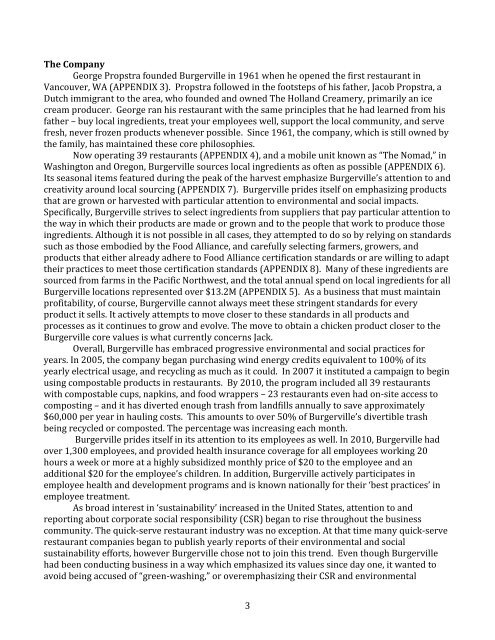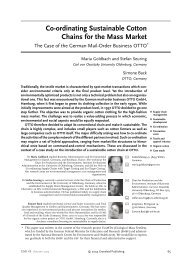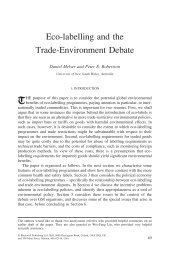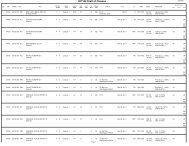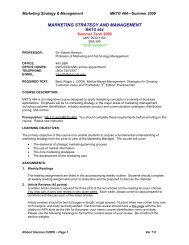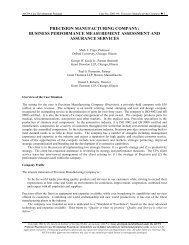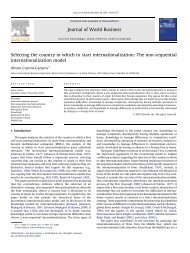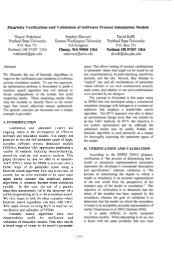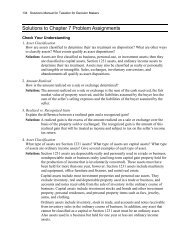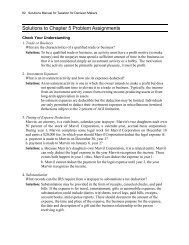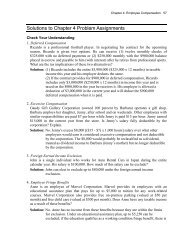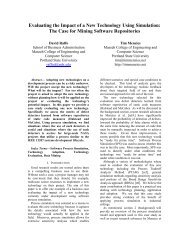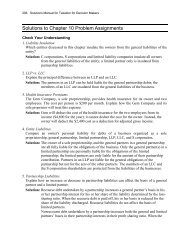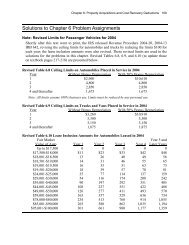Burgerville Supply Chain Case - School of Business Administration ...
Burgerville Supply Chain Case - School of Business Administration ...
Burgerville Supply Chain Case - School of Business Administration ...
Create successful ePaper yourself
Turn your PDF publications into a flip-book with our unique Google optimized e-Paper software.
The Company<br />
George Propstra founded <strong>Burgerville</strong> in 1961 when he opened the first restaurant in<br />
Vancouver, WA (APPENDIX 3). Propstra followed in the footsteps <strong>of</strong> his father, Jacob Propstra, a<br />
Dutch immigrant to the area, who founded and owned The Holland Creamery, primarily an ice<br />
cream producer. George ran his restaurant with the same principles that he had learned from his<br />
father – buy local ingredients, treat your employees well, support the local community, and serve<br />
fresh, never frozen products whenever possible. Since 1961, the company, which is still owned by<br />
the family, has maintained these core philosophies.<br />
Now operating 39 restaurants (APPENDIX 4), and a mobile unit known as “The Nomad,” in<br />
Washington and Oregon, <strong>Burgerville</strong> sources local ingredients as <strong>of</strong>ten as possible (APPENDIX 6).<br />
Its seasonal items featured during the peak <strong>of</strong> the harvest emphasize <strong>Burgerville</strong>’s attention to and<br />
creativity around local sourcing (APPENDIX 7). <strong>Burgerville</strong> prides itself on emphasizing products<br />
that are grown or harvested with particular attention to environmental and social impacts.<br />
Specifically, <strong>Burgerville</strong> strives to select ingredients from suppliers that pay particular attention to<br />
the way in which their products are made or grown and to the people that work to produce those<br />
ingredients. Although it is not possible in all cases, they attempted to do so by relying on standards<br />
such as those embodied by the Food Alliance, and carefully selecting farmers, growers, and<br />
products that either already adhere to Food Alliance certification standards or are willing to adapt<br />
their practices to meet those certification standards (APPENDIX 8). Many <strong>of</strong> these ingredients are<br />
sourced from farms in the Pacific Northwest, and the total annual spend on local ingredients for all<br />
<strong>Burgerville</strong> locations represented over $13.2M (APPENDIX 5). As a business that must maintain<br />
pr<strong>of</strong>itability, <strong>of</strong> course, <strong>Burgerville</strong> cannot always meet these stringent standards for every<br />
product it sells. It actively attempts to move closer to these standards in all products and<br />
processes as it continues to grow and evolve. The move to obtain a chicken product closer to the<br />
<strong>Burgerville</strong> core values is what currently concerns Jack.<br />
Overall, <strong>Burgerville</strong> has embraced progressive environmental and social practices for<br />
years. In 2005, the company began purchasing wind energy credits equivalent to 100% <strong>of</strong> its<br />
yearly electrical usage, and recycling as much as it could. In 2007 it instituted a campaign to begin<br />
using compostable products in restaurants. By 2010, the program included all 39 restaurants<br />
with compostable cups, napkins, and food wrappers – 23 restaurants even had on-site access to<br />
composting – and it has diverted enough trash from landfills annually to save approximately<br />
$60,000 per year in hauling costs. This amounts to over 50% <strong>of</strong> <strong>Burgerville</strong>’s divertible trash<br />
being recycled or composted. The percentage was increasing each month.<br />
<strong>Burgerville</strong> prides itself in its attention to its employees as well. In 2010, <strong>Burgerville</strong> had<br />
over 1,300 employees, and provided health insurance coverage for all employees working 20<br />
hours a week or more at a highly subsidized monthly price <strong>of</strong> $20 to the employee and an<br />
additional $20 for the employee’s children. In addition, <strong>Burgerville</strong> actively participates in<br />
employee health and development programs and is known nationally for their ‘best practices’ in<br />
employee treatment.<br />
As broad interest in ‘sustainability’ increased in the United States, attention to and<br />
reporting about corporate social responsibility (CSR) began to rise throughout the business<br />
community. The quick-serve restaurant industry was no exception. At that time many quick-serve<br />
restaurant companies began to publish yearly reports <strong>of</strong> their environmental and social<br />
sustainability efforts, however <strong>Burgerville</strong> chose not to join this trend. Even though <strong>Burgerville</strong><br />
had been conducting business in a way which emphasized its values since day one, it wanted to<br />
avoid being accused <strong>of</strong> “green-washing,” or overemphasizing their CSR and environmental<br />
3


